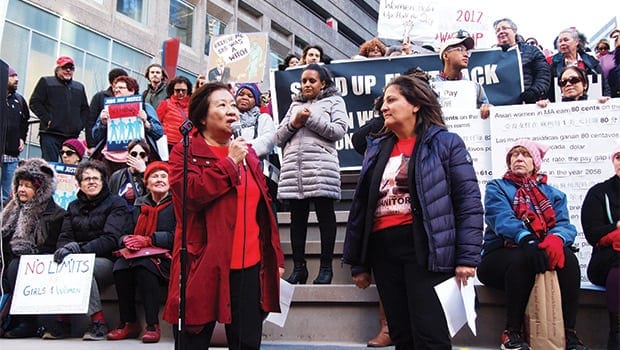Boston’s Day Without a Woman focuses on economics
Boston women call for better wages, immigrant rights

Women filled the risers in Downtown Crossing and spilled out into the surrounding plaza during last week’s A Day Without A Woman demonstration. During March 8, many women who were able to took off from work and avoided making purchases in an effort designed to underscore the economic significance of half the population. Some businesses closed, while others donated portions of the day’s sales to charity.

Demonstrators filled the riser and plaza in Downtown Crossing where they called for respect for women, equal pay for equal work and better working conditions for some workers, and protection from harassment as well as control over their own bodies and access to affordable birth control, among other demands.
Unlike some other protests’ sweeping messages, Boston’s A Day Without A Woman rally focused on concrete goals for improving women’s economic survival and quality of life. Goals included ending the gender wage gap, maintaining housing at rents affordable to current city residents and securing access to affordable child care, said Suzanne Lee, president emeritus of the Chinese Progressive Association and one of the event managers.
“We wanted this to be mainly for working women — you see a crowd that’s very different from the Women’s March,” Lee told the Banner. “A lot of time working women feel like their issues don’t get addressed.”
The rally featured a racially and nationally diverse list of speakers, including union and immigrant rights group members, as well as an elected official, with City Councilor Annissa Essaibi-George taking the mic following a speech from Logan airport wheelchair attendant Davail Gethers. The broad array of backgrounds was part of the rally’s success, said 32BJ SEIU vice president Roxana Rivera, who helped run the event.
“What was most important today was that you saw so many people from different sectors coming together. Childcare workers, teachers, elected officials, coming together to speak up for the rights of women and bettering our communities,” Rivera said.

Protestors of all ages turned out to the local Day Without a Woman rally.
Nationwide
Many demonstrators turned out in red jackets or pink hats to symbolize solidarity. Boston’s event was one of many taking place nationwide on International Women’s Day. The national organizing group said the day’s mission was to highlight, among other causes, the economic significance of women as well as the discrimination many women and female-identifying individuals face.
They sought to draw attention to issue areas such as the persistent gender wage gap — which is even wider for black and Latina women — as well as sexual and gender-based harassment and the need for universal provision of certain workplace protections, such as access to sick care and affordable child care. Other calls included access to medically-accurate sex education and the need for making certain health care services such as birth control and abortion universally accessible and affordable.
Workers’ needs
In the downtown Boston rally, immigrant rights and economic equality took top focus, with many demanding greater respect and better pay for jobs frequently held by immigrant women.
“Domestic work often goes unrecognized,” said Claudia, of the Matahari Women Workers’ Center, who asked that her last name not be used. “We do the work that makes other work possible.”
Caretakers often may spend twelve hours a day looking after others’ loved ones and homes, said Claudia, who works as a nanny and Colombian immigrant. Rose Pierre, a nursing home worker and 1199SEIU member originally from Haiti, said she works two jobs to make ends meet and support her children.
Jianhua Tang was a teacher in China before emigrating for the U.S., where she found employment in an electronics factory and as a homecare worker. She called attention to the gap between average earnings in Chinatown and the rents, as well as the gender wage gap that limits further women’s ability to fight displacement. One driver of income inequality in her community is that women are predominately employed in caretaker positions, where wages tend to be low, she said.
“As caretakers, they’re very important to our society,” Jianhua Tang said, “but their wages are often the lowest.”
Several protestors also noted that protecting the rights of immigrants is integral to bringing greater economic stability to domestic workers and caretakers, given the high representation of immigrant women in the roles.

Demonstrators filled the riser and plaza in Downtown Crossing where they called for respect for women, equal pay for equal work and better working conditions for some workers, and protection from harassment as well as control over their own bodies and access to affordable birth control, among other demands.
Racial wage gaps
The gender wage gap has been well documented. Last year, the Boston Women’s Workforce Council released a report stating that even though Boston’s population is majority female, local women earn roughly 77 cents on the dollar compared to men.
Racial disparities amplify this. In Massachusetts, black women earn 61 cents for every dollar a man earns, and Latina women earn 50 cents on the dollar, according to information presented in 2015 by the state Black and Latino Legislative Caucus and the state Caucus of Women Legislators
Speakers at the 2015 event attributed the wage gap in part due to unconscious bias in hiring and promotion, as well as various factors that can push people into traditionally lower-wage jobs. These include barriers to attending higher education, such as tuition costs and time demands.
Trump effect
While many issues are long-running, the election of Donald Trump has heightened alarm. Speaking before the event, demonstrator Herbert Jean-Baptiste, an 1199SEIU worker, said the presidential election campaign season revealed pervasive misogyny.
One example: “Hillary Clinton got attacked for her looks,” he said.
“Women have lost ground” with the election of a misogynist president, said Natalicia Tracy, executive director of Brazilian Worker Center.






